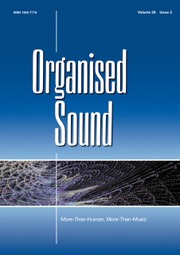Article contents
The technological era of ‘sound’: a challenge for musicology and a new range of social practices
Published online by Cambridge University Press: 30 November 2007
Abstract
The ‘technological revolution’ that took place in music during the twentieth century is equivalent to the revolution that took place between the twelfth and fourteenth century, which transformed musical notation into applications of technology related to creation. This second revolution, as well as the first one, concerns not only musical form, but also the social organisation related to music. The aesthetic of sound is the key factor (in all the genres of contemporary music), which is a major challenge for musical analysis. Society is reorganising itself, favouring the appropriation and amateur practices within musical creation. Musical research institutions – and particularly the GRM – develop new forms of collaboration with their audience and contribute to the constitution of a ‘horizontal’ society, based on exchange, in frank opposition with the ‘vertical’ society, based on a reduced number of producers and a large amount of consumers.
Information
- Type
- Research Article
- Information
- Copyright
- Copyright © Cambridge University Press 2007
- 3
- Cited by

